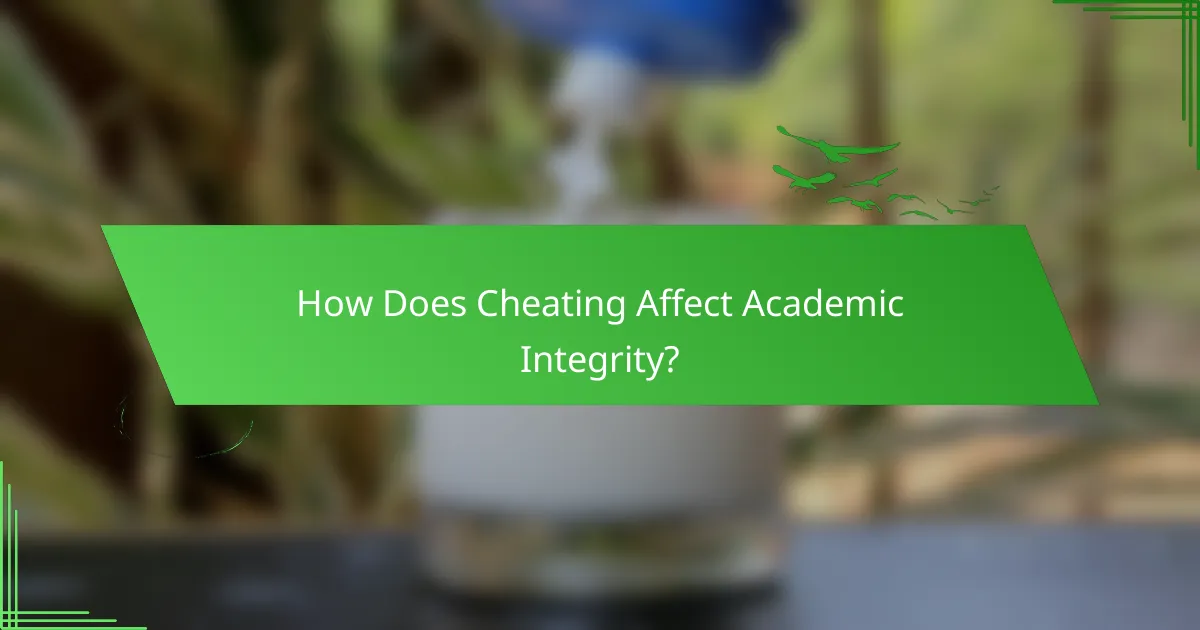Cheating poses a significant challenge to academic integrity and learning styles. It undermines trust, devalues genuine effort, and creates an environment of skepticism. Factors such as pressure to succeed and high-stakes testing contribute to dishonest practices. Educators can combat this by fostering ethical behaviour, diversifying assessments, and promoting open communication.

How Does Cheating Affect Academic Integrity?
Cheating undermines academic integrity by eroding trust and devaluing genuine effort in learning. It creates an environment where dishonesty is normalised, impacting not only individual students but also the broader educational community. Studies show that institutions with high instances of cheating experience diminished respect for academic standards, leading to a culture of scepticism regarding qualifications and achievements. As a result, the long-term effects on students include impaired critical thinking skills and a lack of preparedness for real-world challenges.
What Are the Psychological Implications of Cheating?
Cheating has significant psychological implications, affecting self-esteem and trust. It can lead to guilt, anxiety, and fear of consequences. Students may develop a distorted view of integrity, impacting their future behaviour and learning styles. Long-term exposure to cheating can foster a mindset where success is prioritised over ethical standards, hindering personal growth and academic integrity.
How Do Different Learning Styles Influence Cheating Behaviour?
Different learning styles can significantly influence cheating behaviour, as they affect how students approach academic integrity. Visual learners may cheat through copying materials, while auditory learners might rely on verbal collaboration. Kinesthetic learners may engage in more hands-on cheating methods, such as using physical notes during exams. Research indicates that students with a preference for collaborative learning are more likely to justify cheating as a group effort. Understanding these patterns can inform strategies to promote academic honesty tailored to various learning styles.
What Are the Key Learning Styles Recognised in Educational Psychology?
Cheating undermines academic integrity and can negatively influence learning styles. Recognised learning styles include visual, auditory, and kinesthetic. Cheating may disproportionately affect students with specific styles, disrupting their engagement and retention. For instance, visual learners might struggle with the absence of authentic visual aids in a compromised academic environment.
How Does Visual Learning Style Impact Cheating Decisions?
Visual learning style can lead to increased cheating decisions due to reliance on visual aids over critical thinking. Visual learners often seek shortcuts, favouring immediate results over in-depth understanding. As a result, they may resort to dishonest practices when faced with challenging material. Research indicates that students with a strong visual learning preference are more susceptible to academic dishonesty, highlighting the need for tailored educational strategies that promote integrity.
What Role Does Auditory Learning Style Play in Academic Dishonesty?
Auditory learning style can contribute to academic dishonesty by influencing how students process information. Students who learn better through listening may rely on external sources, like peers or recordings, for exam preparation. This reliance can lead to temptation to cheat, especially if they struggle to grasp concepts independently. Research indicates that auditory learners may face unique pressures, increasing the likelihood of dishonest behaviour to meet academic expectations. Understanding these dynamics is crucial for fostering integrity in educational environments.
How Do Kinesthetic Learners Approach Cheating?
Kinesthetic learners may approach cheating differently due to their hands-on learning style. They often rely on physical engagement and may perceive cheating as a practical shortcut to achieve immediate results. This behaviour can undermine their understanding of academic integrity and long-term learning. Cheating can hinder the development of critical thinking skills, which are essential for kinesthetic learners who thrive on experiential learning. As a result, the impact of cheating on their educational journey can be significant, leading to a cycle of dependence on dishonest practices rather than fostering genuine comprehension and skill acquisition.

What Are the Universal Attributes of Cheating in Education?
Cheating in education undermines academic integrity and negatively impacts learning styles. Its universal attributes include dishonesty, lack of accountability, and diminished trust among peers and educators. These attributes manifest in various forms, such as plagiarism, exam fraud, and unauthorised collaboration. Cheating not only affects the cheater’s understanding but also devalues the efforts of honest students, creating an environment of scepticism and competition rather than collaboration.
What Motivates Students to Cheat?
Students are motivated to cheat primarily due to pressure to achieve high grades and fear of failure. Academic stress can lead to a lack of confidence in their abilities, pushing some to resort to dishonest methods. A significant factor is the perception of competition among peers, where students feel that cheating is necessary to keep up. Additionally, some students may believe that the benefits of cheating outweigh the risks, viewing it as a means to an end rather than a moral failing. This mindset can severely impact their learning styles and overall academic integrity.
How Do Cultural Factors Shape Cheating Behaviours?
Cultural factors significantly influence cheating behaviours by shaping moral perspectives and societal norms. Different cultures have varying attitudes towards academic integrity, impacting students’ decisions to cheat. For instance, collectivist cultures may prioritise group success over individual achievement, potentially fostering environments where cheating is more accepted. Additionally, cultural pressures can create a sense of competition, leading to rationalisations for dishonest behaviours. Understanding these cultural dimensions is crucial for addressing cheating and promoting integrity in educational settings.

What Unique Factors Contribute to Cheating Among Students?
Cheating among students often stems from pressure to succeed, lack of preparation, and perceived opportunity. These unique factors create an environment where academic integrity is compromised. High-stakes testing and competitive academic environments can intensify the urge to cheat. As a result, students may resort to dishonest practices to maintain grades and meet expectations.
How Do Personality Traits Correlate with Cheating?
Personality traits significantly influence cheating behaviours. Traits such as low conscientiousness and high neuroticism correlate with increased likelihood of academic dishonesty. Research indicates that individuals with these traits may prioritise short-term gains over long-term integrity. Understanding these correlations can inform educational strategies to promote academic integrity.
What Impact Does Peer Pressure Have on Cheating?
Peer pressure significantly influences cheating behaviour among students. It can create an environment where academic dishonesty is normalised, leading individuals to compromise their integrity. Studies show that students who perceive their peers as cheating are more likely to engage in similar behaviour, undermining their learning styles and academic values. This phenomenon highlights the unique attribute of social influence in educational settings, emphasising the need for fostering a culture of integrity.

What Are the Rare Attributes Associated with Cheating?
Cheating is often associated with unique attributes that highlight its deeper implications. Rare attributes include emotional detachment, which reflects a lack of empathy towards others’ efforts, and a distorted perception of success, where individuals prioritise grades over genuine learning. Another rare attribute is the potential for long-term academic disengagement, leading to a cycle of dependency on dishonest practices. Lastly, the impact on peer relationships can be significant, as trust is eroded among students, affecting collaboration and support.
How Does Socioeconomic Status Influence Cheating Behaviour?
Socioeconomic status significantly influences cheating behaviour, often correlating with academic pressure and access to resources. Students from lower socioeconomic backgrounds may experience heightened stress, leading to a greater likelihood of engaging in dishonest practices to succeed. Research indicates that these students may perceive cheating as a necessary means to overcome systemic barriers. Additionally, wealthier students might cheat for competitive advantage, reflecting a unique attribute of privilege that shapes their ethical perspectives. Understanding these dynamics is crucial for addressing academic integrity issues across diverse educational settings.
What Are the Long-term Effects of Cheating on Academic and Career Success?
Cheating can lead to significant long-term effects on both academic and career success. It undermines personal integrity and erodes trust, which are vital in professional environments.
Students who cheat may struggle with essential skills, resulting in gaps in knowledge and abilities. This often translates to lower performance in future educational pursuits and career opportunities.
Research indicates that individuals who engage in dishonest practices are more likely to experience negative consequences such as anxiety, guilt, and a lack of self-esteem. These psychological effects can hinder career advancement and personal growth.
Ultimately, the long-term implications of cheating extend beyond immediate academic performance, impacting career trajectories and overall life satisfaction.

How Can Educators Address Cheating in the Classroom?
Educators can address cheating by fostering a culture of academic integrity and implementing proactive strategies. Emphasising ethical behaviour encourages students to value honesty in their work.
Incorporating diverse learning styles into assessments can reduce the temptation to cheat. For instance, offering project-based evaluations allows students to demonstrate understanding creatively.
Providing clear guidelines on academic integrity is essential. Educators should communicate the consequences of cheating to deter dishonest behaviour.
Finally, promoting open communication between students and teachers builds trust. When students feel comfortable discussing challenges, they are less likely to resort to cheating.
What Strategies Can Be Implemented to Promote Academic Integrity?
Promoting academic integrity requires a multifaceted approach. Strategies include fostering a culture of honesty, implementing honour codes, and utilising technology for plagiarism detection. Educators should emphasise the value of original work and provide resources for effective study techniques. Regular workshops can enhance awareness of academic integrity principles.
How Can Understanding Learning Styles Help Prevent Cheating?
Understanding learning styles can help prevent cheating by fostering personalised educational experiences. When educators recognise individual learning preferences, they can create engaging environments that reduce the temptation to cheat. Tailored instruction addresses diverse needs, enhancing student understanding and motivation. As a result, students feel more confident in their abilities, leading to greater academic integrity.
What Are Effective Teaching Methods for Different Learning Styles?
Effective teaching methods for different learning styles enhance academic integrity by promoting understanding and retention. Visual learners benefit from diagrams and videos, while auditory learners excel with discussions and lectures. Kinesthetic learners thrive through hands-on activities. Tailoring methods to these styles reduces the temptation to cheat, fostering a deeper commitment to learning. Engaging students according to their learning preferences supports ethical academic practices, ultimately reinforcing the value of integrity in education.
What Best Practices Can Educators Follow to Minimise Cheating?
Educators can minimise cheating by fostering a culture of academic integrity and implementing specific strategies. Establish clear expectations regarding academic honesty, and communicate the consequences of cheating. Use varied assessment methods to engage different learning styles and reduce opportunities for dishonesty. Encourage collaboration and open discussions about ethics in learning. Regularly review and update assessment practices to maintain fairness and relevance. Provide support resources for students struggling with material to reduce the temptation to cheat.
What Common Mistakes Should Educators Avoid When Addressing Cheating?
Educators should avoid blaming students, failing to address root causes, and ignoring the importance of academic integrity. These mistakes can undermine trust and hinder effective learning. Instead, fostering open communication and understanding diverse learning styles can promote a culture of honesty. For example, recognising that some students may struggle with specific subjects can guide educators in providing appropriate support.
How Can Students Foster a Culture of Integrity Among Peers?
Students can foster a culture of integrity among peers by promoting open discussions about the consequences of cheating. Encouraging collaboration and emphasising the value of honest academic efforts strengthens community bonds. Peer-led workshops can educate about academic integrity, highlighting its benefits for personal growth and learning styles. Establishing accountability systems, such as peer review processes, reinforces commitment to integrity.




